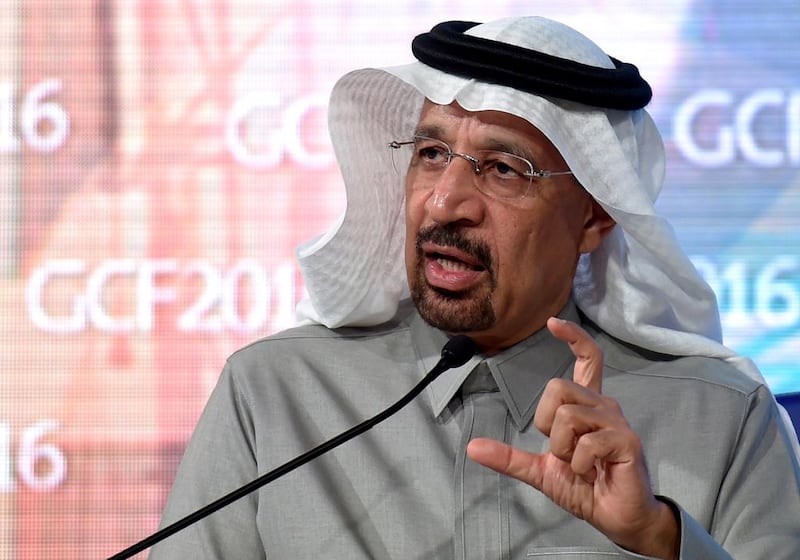Now that Saudi Arabia’s state oil company Aramco has taken its main asset – its oil reserves – off the table, what part of the company might it actually offer for sale to the public?
Ever since the idea of an initial public offering of shares in Aramco was floated by Mohammed bin Salman, deputy crown prince and 30-year-old son of Saudi Arabia's King Salman, in an interview with The Economist this month, Aramco officials have been busy dialling back expectations.
The latest comments came from Aramco’s chairman, Khalid Al Falih, who took the air out of all the excited talk of a “multitrillion-dollar” flotation, although still leaving it vague what assets might actually be up for sale.
“The oil reserves belong to the state,” he said in an interview with Al Arabiya, a Saudi-owned broadcaster, while attending the Davos summit. “What will be offered is the economic value of Saudi Aramco, and not its oil reserves … [that is to say] the ability of the company to produce from those reserves.”
In typically Delphic fashion, he expanded slightly on those comments this week at a conference in Riyadh, saying options being considered include a percentage of “everything we do” and some form of bundling “together a significant downstream portfolio”.
Seasoned industry observers say that at least it is clear what is off the table.
“I never thought they would put Aramco as a whole up for IPO,” said Louis Besland, the Abu Dhabi-based head of Middle East oil and gas at AlixPartners, a firm of consultants.
Even if Aramco were to consider selling a percentage of “everything we do” minus the oil reserves, it would be an extremely hard entity for investors to value.
The share price of international oil companies – BP, ExxonMobil, Royal Dutch Shell, etc – are based to a large extent on the value investors put on their oil and gas reserves. For Aramco to legally remove title to its reserves and then try to sell shares on a claim to some measure of oil production seems to many like a pointless exercise.
“As things stand, private investment in Saudi Aramco [as a whole] looks very unattractive,” said Paul Stevens, an energy expert at the Royal Institute for International Affairs in London. “You won’t know what you are buying because of a total absence of transparency, and the company is not at all profitable after tax.”
Saudi Arabia would never relinquish control over its oil output, which is its principal tool for domestic and foreign policy control, leaving analysts to parse the deputy crown prince's move and Aramco officials' reaction for their true meaning.
“I think that the motivation was to do with flagging the fact that serious economic reforms and changes are under way,” said Mr Stevens. “What better than to appear to attack the sacred cow?”
Even much-scaled-down ambitions, where Aramco might look for outside equity participation in corners of its operations, could have that desired effect.
“It has always been extremely unlikely they would IPO the exploration and production part of the business. But even when you start to think about listing the smaller parts of Aramco, it could bring a lot of transparency and I think that was [the deputy crown prince’s] key message,” said Sachin Mohindra, a portfolio manager at Invest AD, an Abu Dhabi investment fund.
There is a precedent for that kind of offering. Petro Rabigh, for example, is a petrochemical refining complex that is part-owned by Aramco and Japan’s Sumitomo Chemical – each has a 37.5 per cent stake – with the remaining shares having been offered via the Saudi stock exchange in 2008, when 4.5 million Saudi individuals oversubscribed five-fold for a stake.
Petro Rabigh shares have had a pretty torrid time, having been launched in the midst of a world financial crisis, which involved them dropping from a high after launch of 64 Saudi riyals to below 20 riyals. After a period of relative stability they have dropped to a recent low of 7 riyals as the oil price crash took its toll.
Still, says Mr Mohindra, Aramco officials have learnt from the experience and have made management changes at Rabigh last year that should help to fix some of the issues it has faced, such as supply chain disruptions.
He says the most likely assets for Aramco to sell first would be similar joint ventures where there is already a degree of transparency via a publicly-listed partner and an operating history – Mr Mohindra points to Sadara Chemical Company, the US$20 billion Aramco joint venture with Dow Chemical, which recently began to ramp up.
“I don’t see any reason why that, or something like that, can’t be brought in part to the market,” he says.
Mr Besland agrees that the more mundane option of offering pieces of Aramco’s vast downstream operations is the strategy that best meets its goals.
“Really, the most sensible option and most probable option, in the short term at least, would be to float participation in the downstream businesses,” he said. “That makes sense and it is where they really need to invest in the future to create more economic development.”
In any case, “whatever they would like to IPO it will be too big to be ignored,” said Sebastien Henin, head of asset management at The National Investor in Abu Dhabi. “Even the downstream part of the business might be interesting – margins have improved recently in that subsector, which can bring more attention from investors.”
That certainly wouldn’t be the radical free market jolt that the crown prince was musing over, but it would be a more realistic objective.
amcauleythenational.ae
Follow The National's Business section on Twitter





